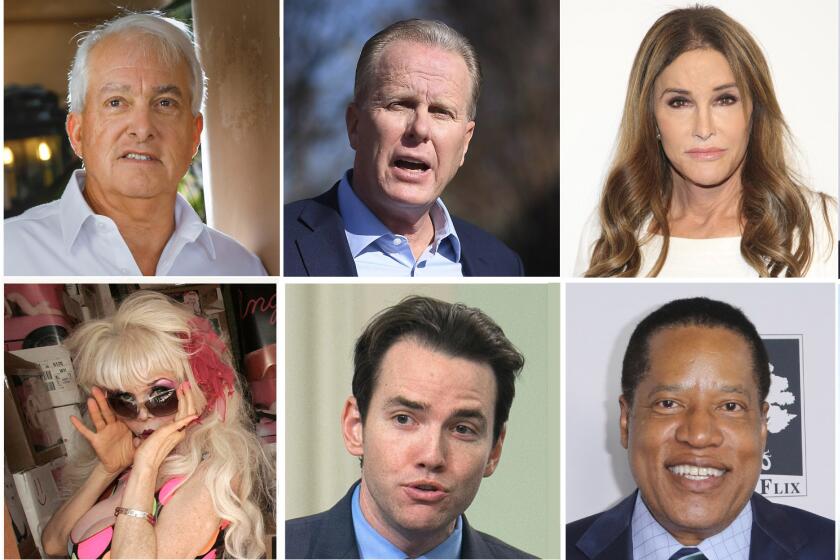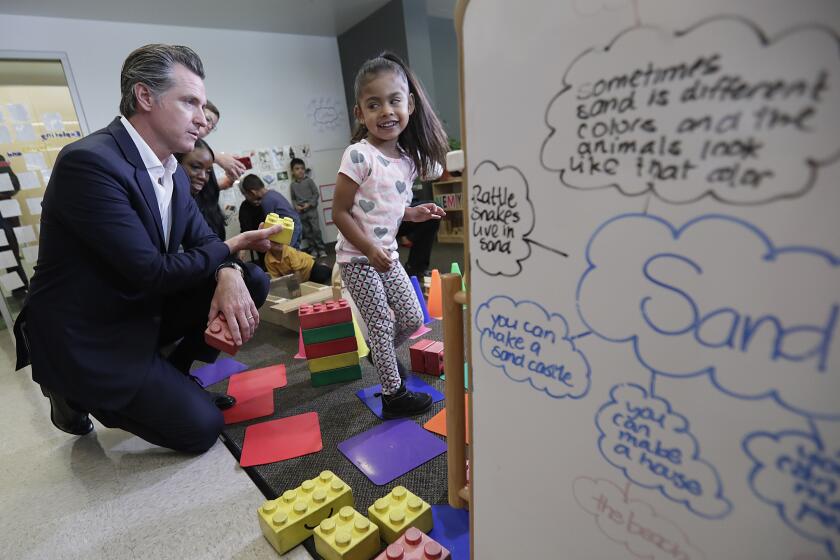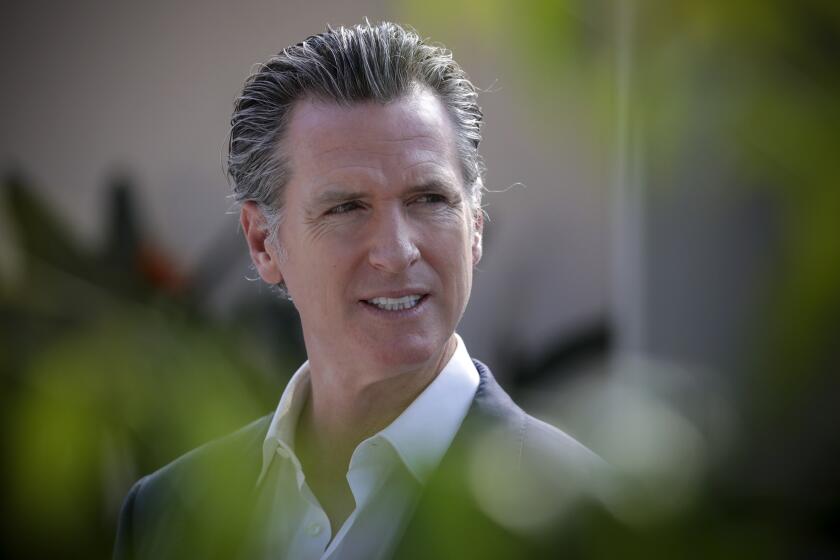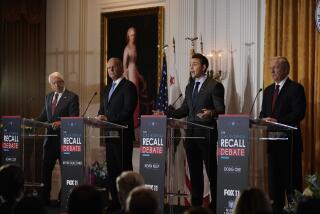Editorial: Los Angeles Times recommendation: No on Newsom recall, Faulconer on Question 2

The Los Angeles Times editorial board questions the recall candidates on issues including homelessness and abortion rights.
Question 1
Ballots for the Sept. 14 special recall election have been mailed to 22 million California voters. The ballot poses two questions. The first is whether Gov. Gavin Newsom should be removed from office.
The correct response is a strong, unequivocal no.
Removing Newsom and replacing him with an untested and unprepared alternative who wouldn’t represent the values of most Californians would be a disaster. It would doom the state to months of political and bureaucratic dysfunction and economic uncertainty. And for what purpose?
Newsom, who is 53 years old and 2½ years into his first term as governor, hasn’t been perfect — but show us a governor who has. His public communications have been muddled and confusing at times. He has not worked as well with the Legislature as he could. He has occasionally promised more than he could deliver. His prodigious fundraising has raised legitimate concerns about the role of money in politics.
These are things that voters would appropriately consider during a regular reelection campaign, but they do not justify using the extraordinary power of recall to remove a legitimately elected governor in favor of someone who may only have a sliver of support from voters. Indeed, by our reckoning, Newsom’s missteps are minor when compared to the good he has done for California as one of the nation’s strongest leaders on the COVID-19 pandemic. In our hyperpolarized time, sadly, decisive leadership has also enraged and galvanized the governor’s critics.
2021 Recall
How to vote
The ballot you will receive in the mail contains two questions. Here they are, with how The Times Editorial Board recommends you vote.
1. Shall Gavin Newsom be recalled (removed) from the office of Governor?
Vote no.
2. Candidates to succeed Gavin Newsom as Governor if he is recalled. Vote for one.
Hold your nose and select Kevin L. Faulconer.
And while pandemic response has been his top responsibility over the last year and a half, Newsom has also started work on solving some of the state’s most intractable problems, using the state’s historic budget surplus to fund programs to help individuals and business recover from the pandemic, build more affordable housing, house the state’s unsheltered and prevent and fight wildfires.
The 46 candidates vying to replace Newsom — most of them men, most of them Republican, and most of them utterly unqualified — offer an endless litany of grievances that are little more than objections to his liberal policies — policies, we may add, that were clear to everyone when 62% of voters chose Newsom in the 2018 election. The whole thing would be comical if the stakes weren’t so high.
The critics paint a picture of a state teetering on collapse that is wildly irresponsible and in many cases just flat wrong: The streets are overrun with criminals thanks to Newsom! (Nope.) People and businesses are fleeing California in record numbers because of his terrible policies! (Wrong.) Newsom caused the state’s massive wildfires because he mismanaged the forest! (Ridiculous.) He kept changing the rules during the pandemic — but he also didn’t change them enough! (What?)
The 110-year-old recall rules are showing their age and need updating. Most Californians agree.
The reality is that Newsom took office in January 2019 amid literal and figurative wildfires: Homelessness was rising and reaching a tipping point. The state’s largest electric utility, PG&E, was in bankruptcy because of negligence that started infernos like the one that wiped out the town of Paradise. The state’s information technology systems were (and still are) hopelessly out of date, leading to one of the first challenges of Newsom’s administration, at the Department of Motor Vehicles. Climate change was and still is accelerating, squeezing the state’s power grid during its transition to renewable energy sources and straining its water supply.
These crises were years in the making and — let’s face it — Newsom inherited them from his Democratic predecessor, Jerry Brown. But Newsom had the misfortune to take office just as they reached the boiling point. And then, the pandemic hit and forced Newsom to pivot into emergency mode and set aside the usual business of governance to focus on addressing the emerging and not fully understood threat of COVID-19.
Newsom’s biggest error was a momentary lapse of judgment. As governor, he issued tough public health restrictions intended to limit the spread of COVID-19, including a limit on more than three households gathering. But he didn’t always follow his own guidance; in November he and his wife dined unmasked and shoulder to shoulder with 10 other people in a private semi-enclosed outdoor room at the French Laundry, a high-end restaurant in Napa Valley. It was a mistake, for which Newsom apologized — but it was in no way a fireable offense.
Unfortunately for the governor, and for California, the blunder happened at a critical juncture for the latest gubernatorial recall effort (the four filed over the previous year failed to qualify). Not two weeks after the dinner, a judge granted the recall’s proponents an extra four months to gather signatures, reviving it from all-but-certain failure. With the help of Republicans such as former U.S. House Speaker Newt Gingrich, who saw an opportunity for political disruption in the blue state they love to hate, the recall effort was able to hitch a ride on the inchoate frustration, anger and grief Californians were feeling after months of pandemic restrictions, political divisions and civil unrest.
What’s at stake in this election is ultimately not Newsom’s political career but California’s values and our democracy. A new Republican governor would struggle to get laws passed given a hostile Democratic supermajority in the Legislature, which could override a gubernatorial veto. But he or she could reshape California for decades to come through the use of executive orders to roll back environmental protections, criminal justice reform and the social safety net.
Governors also wield power by appointing judges and regulators, such as those overseeing the state’s power utilities and coastal commission, and, in the case of a vacancy, members of Congress. Newsom named successors to Kamala Harris, who left the Senate to become vice president, and Xavier Becerra, who resigned as state attorney general to become President Biden’s Health and Human Services secretary. Should Sen. Dianne Feinstein, who is 88, retire next year, whoever is governor would have a chance to select her replacement.
And who might that appointment be? House Minority Leader Kevin McCarthy (R-Bakersfield), who asserted that Donald Trump was the real winner of the 2020 presidential election? Rep. Darrell Issa (R-Bonsall), who used his House seat to hound and harass Presidents Obama and Biden?
If times have seemed tough over the past year — with our lives, our environment and our democracy under grave threat, with political violence simmering just under the surface of every heated debate, and families and neighbors so polarized that they can’t hold a civil conversation — remember that they can always get worse.
Gavin Newsom has made his share of mistakes. We’re not thrilled with the complacency that characterizes parts of the Democratic power structure in California, or with the outsize power of public-sector unions. There is no doubt that California liberalism hasn’t exactly solved soaring homelessness, persistent economic and social inequality, a mediocre education system and, most pressing of all, a housing crisis that threatens the future of the Golden State as a place of opportunity and growth.
It’s the only way to avoid a Republican who could do serious harm before being voted out of office.
But we are thrilled by California’s values. This state has chosen to be a national leader on the environment, criminal justice reform and the social safety net because state leaders and voters have chosen to look forward, not backward. We want a healthier planet, more just communities and opportunity for people to live and love in peace and freedom.
To be sure, Newsom’s self-inflicted wounds have dismayed us. We wish, even now, that he would make a more forceful, proactive case for his record, and not simply denounce his recall opponents as Trumpian extremists (though some of them are).
In tough times, citizens may be tempted to throw out the incumbent and try their luck with someone offering shiny new ideas. That rarely works out for the better. Don’t gamble with California’s future. Vote no on the recall and let Newsom finish his term. If you’re not happy, you’ll have a chance in next year’s election to choose someone else.
Question 2
The second question on the ballot asks voters to choose one of 46 people to take over should Newsom be recalled. For Californians who oppose removing Newsom, this answer is not so simple. As an editorial board, we have struggled over our recommendation, because we can say with certainty that none of the people hoping to replace Newsom would be an improvement.
The editorial board members have met with six of seven leading candidates (Caitlyn Jenner’s campaign did not respond to our invitation). There may be gems among the other 39 candidates, but neither the board nor the voters are likely to find out before ballots are due on Sept. 14, as they don’t have much if any political support and virtually no chance of winning.
Faced with such terrible choices, it’s tempting to skip this difficult question altogether and to recommend leaving this part of the ballot blank, as the Democratic Party has urged. Why dignify this reckless power grab by participating in it in any way?
We have concluded, after searching debate and reflection, that that is a cowardly way out and would hand the decision-making power to others who do vote — and those voters may be uninformed, irrationally angry and looking for someone to take a far-right turn on issues like climate change, environmental protection, civil rights, policing and vaccination. That’s too great a gamble.
We’re left to conclude that voters who oppose the recall should also vote for a replacement — even if they have to hold their noses to do so.
But who?
Californians were extremely lucky in 2003, when they voted to recall then-Gov. Gray Davis in favor of Republican movie star Arnold Schwarzenegger, who managed to grow into the job to become a decent, if not great, governor. But looking at the field of top recall candidates leads us to believe California is unlikely to be so fortunate in 2021.
It’s hard to find much to recommend the front-runners. All oppose to some degree the pandemic actions taken by Newsom, including mask mandates and vaccine requirements.
Gov. Gavin Newsom and Democrats are singularly focused on Californians casting a “no” vote on the first part of the recall ballot. That may leave some voters unaware they can also choose a replacement in the event Newsom loses.
But some are worse than others. Case in point is the man who is polling highest among those who favor recall: the conservative radio host Larry Elder. Not only does he have no experience in elective office, Elder is a Trumpian ideologue who has called climate change a “crock” and said there should be no minimum wage.
Supporting Jenner, the transgender reality TV star, former Olympian and member of the Kardashian clan, might seem as great an advance in LGBTQ representation as Newsom’s 2004 decision, when he was San Francisco’s mayor, to grant marriage licenses to same-sex couples. But she is a clueless lightweight, who demonstrates little knowledge of how the state works or the scope of, and limitations on, the governor’s powers. It wouldn’t do the LGBTQ community any favors to have her fail spectacularly as leader of the state.
Then there’s Republican John Cox, the San Diego businessman and self-funded perpetual candidate who lost to Newsom in the 2018 general election. He was not qualified for the job then, and the only apparent difference in his 2021 campaign is the Kodiak bear and gigantic ball of plastic trash he’s been hauling around the state to make a point about … well, we’re not exactly sure.
Angelenos may not know much about Doug Ose, a land developer and former three-term Republican congressman from the Sacramento area. His only distinction from the pack is that he’s straightforward about the damage he would do to California, namely abandoning criminal justice reforms, building new prisons and putting the interests of the state’s agricultural lobby ahead of its environment and its residents.
Assemblyman Kevin Kiley (R-Rocklin) is an impressively knowledgeable young policy wonk with degrees from Harvard and Yale, but also a worrisome ideologue. When we asked Kiley who won the 2020 presidential election, he refused to say whether Biden was legitimately chosen. That’s shameful. He reminds us of Republican opportunists like Gov. Ron DeSantis of Florida, Sens. Josh Hawley of Missouri and Tom Cotton of Arkansas, and Rep. Elise Stefanik of New York, who benefited from Ivy League educations but have veered far right to pander to Trump supporters when they certainly know better.
Democrats and left-leaning independent voters may be inclined to support Kevin Paffrath, a 29-year-old social media influencer who, with his 1.69 million YouTube subscribers, is the closest thing to a prominent Democrat on the ballot. He exudes enthusiasm and idealism, and may share some basic Democratic values with most Californians, but he’s not a serious candidate any more than Los Angeles billboard star Angelyne. Besides, some of his proposals — rounding up homeless people and forcing them into shelters, and enacting massive tax cuts — make us question whether he truly stands for anything besides his own fame.
That leaves us with the least terrible of all these bad options: former San Diego Mayor Kevin Faulconer, a moderate Republican. He is perhaps the most conventional gubernatorial candidate and has the executive experience and mature temperament that other recall candidates lack.
Faulconer is pro-vaccination. He acknowledges Biden’s victory. He supports abortion rights and strong efforts to mitigate climate change. He points to his work with a majority-Democratic City Council and his ability to get elected, twice, in a city where only a quarter of voters are registered Republicans as evidence of his bipartisan bona fides.
Faulconer, 54, stands for the kind of traditional Republican values that the GOP espoused during decades of electoral dominance in California. Alas, the party that produced Earl Warren, Richard M. Nixon, Ronald Reagan and other leaders who reshaped postwar American politics has lost serious credibility over the past decade as demagogues and extremists have taken over more of the GOP.
In a normal general election, Faulconer would merit scrutiny. But it’s hard to see how he could remain politically viable in this extremist era without tapping into the Trump-dominated national Republican infrastructure. We are also concerned about Faulconer’s involvement while San Diego mayor in a sketchy real estate deal in which the city paid more than the assessed value for an office building. He should publicly answer questions about his role in this deal.
We fervently oppose the recall of Gavin Newsom, and we do not support Kevin Faulconer for governor. But for those who care about the stability of California, Faulconer is the least bad option in a recall field that ranges from the merely bad to the utterly catastrophic.
More to Read
A cure for the common opinion
Get thought-provoking perspectives with our weekly newsletter.
You may occasionally receive promotional content from the Los Angeles Times.













